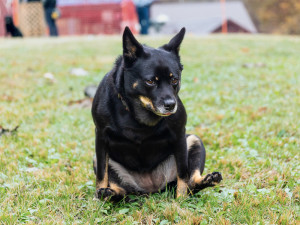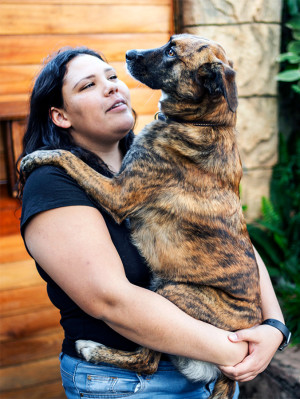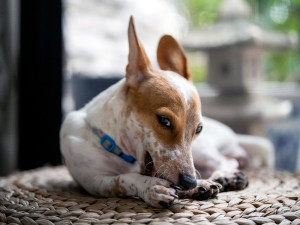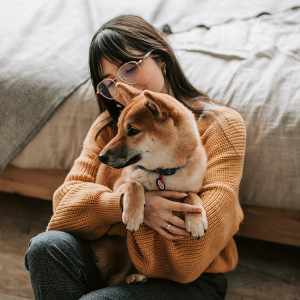
Share Article
In This Article:
Common Reasons for Carpet Scratching Situational Carpet Scratching How to Stop Dog Scratching Carpet Frequently Asked Questions
There’s nothing quite like getting all cozy under the covers to watch your favorite movie, only to be interrupted by your pup incessantly scratching at the carpet, or even worse, dragging their butt along your nice, clean floor. What gives? Dogs may scratch the carpet for a variety of reasons, ranging from natural instincts to behavioral issues. Understanding the cause of your dog’s carpet-scratching is crucial for addressing the behavior and finding effective solutions.
There are a number of reasons why your dog may be scratching the carpet. It‘s important to get to the root of it in order to best address the problem and help your dog find more constructive outlets for their needs. Some of the common reasons why dogs may scratch include instinctive behaviors, anxiety, boredom, or health problems. Read on to learn more.
Main takeaways
Scratching can be a normal behavior inherited from dogs’ wild ancestors.
Some dogs scratch obsessively due to behavioral problems.
Paying close to attention to where, when, and how your dog scratches can help you determine the underlying reason.
There are effective ways to discourage your dog from scratching but more extreme cases will require professional help.
Common reasons dogs scratch the carpet
There are many reasons for dogs to scratch at the floor. Keen observation of how your dog is scratching, when the scratching is most intense, and other related changes in their behavior or health can help you narrow down what is motivating your dog’s desire to scratch. This includes:

Instinctual behaviors
Scratching and digging are normal dog behaviors in many instances. These are behaviors passed down through their wolf ancestry and may have had an origin in survival strategy or social interactions with other wolves. For example, wolves and wild dogs will instinctively bury their food, including treats, to hide them from other competing animals. Dogs may scratch the ground or dig in an attempt to cover up a valuable treat, snack, or toy too. Other times, they may scratch or dig as a form of marking.
Both wolves and dogs have scent glands on their paws, and they may use these as a way to communicate with other animals. Some dogs will also scratch or dig right after they urinate or defecate, and this is believed to be an additional way that they mark to communicate. Finally, digging is an instinctual behavior that is very useful in the wild. It allows animals to reach prey that may be deep in a burrow, and it also allows them to create a safe den deep in the ground that will be cool and protected. Dogs who do not have access to outdoor areas to dig may substitute actual digging for scratching on the floor, carpet, or even your bed.
Anxiety and stress
When dogs are scared, stressed, or experiencing anxiety, they may also scratch or attempt to dig repetitively. This may be their attempt to escape a scary situation or come find you if they are stressed by your departure. Other times, anxiety may also result in repetitive, compulsive behavior that is not necessarily driven by a rational plan or desire. Some dogs will scratch obsessively in this case, too.
Boredom
Compulsive, repetitive behaviors can also be a sign of boredom and a lack of mental and physical stimulation. Dogs may scratch as a result of boredom, and pet parents may accidentally reinforce the behavior by giving their dog attention when they do this.
Physical problems
Dogs who are itchy may rub their face or butts on the floors or furniture in an attempt to soothe their itch. There are many reasons for dogs to be itchy and some of the most common ones include allergies, dry skin, fleas, or anal gland problems.
Situational carpet scratching
Noticing when your dog scratches the carpet and what other behaviors or activities may trigger it can help you home in on the underlying reason. Some specific situations when dogs may scratch include:
Why does my dog scratch the carpet after a walk?
This likely relates back to the instinct to scratch after urinating or defecating. Dogs and wolves are thought to do this as an additional way of marking, or communicating with others. Some dogs will scratch outside right around the area where they eliminated, but other dogs may do this when they come inside.
Why does my dog scratch the carpet at night?
Scratching at night may have a few different explanations. Some dogs like to scratch before they lay down for the night. This is likely influenced by their instinct to create a nest-like den for sleep. Some dogs also dig before they lay down to reach the cooler layers of the dirt if they are hot, so dogs living indoors may scratch in an attempt to seek out a cooler surface. Other times, this can be more of a compulsive behavior related to boredom, or other behavioral conditions, including cognitive dysfunction in older animals.
Why does my dog scratch the carpet during storms?
For many dogs, storms can be a source of fear and anxiety. The sound of thunder is often triggering for many dogs and with their excellent hearing, they can hear the thunder far off in the distance long before we can. Signs of anxiety in dogs with storm phobias can vary. Some dogs slink off and hide, others may pace or whine, and some will scratch or perform other repetitive behaviors.
Why does my dog scratch their butt on the carpet?
Dogs have no shame about scratching their butts on your floor, furniture, or fancy new rug. This one is usually caused by itchiness. Sometimes it’s as simple, and gross, as a little poop stuck on their fur or around their butt that they’re trying to remove. Other times, the itch may be related to skin irritation, allergies, or anal gland problems.
How to stop your dog from scratching the carpet
Positive reinforcement
The general concept of positive reinforcement is to reward the behaviors you do want and to ignore behaviors you want to stop. If your dog’s scratching is destructive, it may be difficult to ignore. However, if you stop what you’re doing every time your dog starts scratching and give them attention, even if it's not fun attention, you may be unintentionally reinforcing their behavior. Instead, try to work on teaching your dog cues for the types of behaviors you do want to see, like training them to go to their mat or crate, and then reward them for doing so. If you catch them mid-scratch, try redirecting them to a better activity.
Redirection
Offer your dog an approved activity to redirect them from a behavior you don’t want. This may include using a cue to get them to go their designated place in your home, or offering them a toy or other activity to distract them from scratching.
Exercise and mental stimulation
This is important for all dogs, and is especially important for dogs who may be scratching due to boredom or anxiety. Dogs need lots of exercise and mental enrichment every day to give them healthy outlets for their energy. In addition to daily walks to pee and poop, be sure your dog has opportunities to run, socialize with other dogs, and explore new routes in ways that are safe and appropriate for their specific health and behavioral needs. All dogs also need mental enrichment in addition to exercise. You can use food puzzles, training sessions, agility courses, and even scent games to challenge your pup.
When to seek professional help: If your dog’s scratching seems compulsive, they seem severely fearful or anxious, or you suspect there is an underlying medical problem, it is important to seek professional help. These kinds of behavioral and medical problems will require more in-depth behavior modification or medications to help your dog get relief and feel their best. Occasional scratching when your dog can be easily redirected is not a cause for concern.
FAQs
Can carpet scratching be a sign of anxiety?
Yes, scratching can be a sign of anxiety, especially if it is repetitive and difficult to redirect your dog to other activities, and if you notice other signs of anxiety. There are many ways to help an anxious dog find relief in more constructive ways.
Why does my dog burrow under the covers and dig in bed?
Some dogs burrow and dig in the bed, due to their instinct to form a den or nest like their wild ancestors. This can be a safe, quiet space for them to sleep.
References
Bekoff M. “Ground scratching by male domestic dogs: a composite signalopens in new tab.” J. Mammal, vol. 60, 1979, pp. 847–848.
Heinrich, A. “Compulsive and Repetitive Behaviors.opens in new tab” Veterinary Partner, May 24, 2023.
McClanahan, Kari, and Frank Rosell. “Conspecific recognition of pedal scent in domestic dogsopens in new tab.” Scientific reports, vol. 10, no. 1, October 20 2020, pp. 17837.
Youngerman, Claire. “Digging in Dogsopens in new tab.” UC Davis Veterinary Medicine Animal Health Topics, 2019.

Dr. Amy Fox, DVM
Amy Fox, DVM is a small animal veterinarian in New York City with over thirteen years of experience in a mixture of general practice, emergency medicine, and shelter medicine. A lifelong animal lover, Dr. Fox studied biology in college and then worked as a veterinary nurse before pursuing veterinary school at Cornell University. Her expertise includes surgery, dentistry, and management of chronic conditions, and she is interested in toxicology, pain management, nutrition, care of senior pets, and educational outreach. Dr. Fox also enjoys writing about veterinary medicine and teaching, and her work has previously appeared in Spruce Pets. In her free time, she loves to cook, garden, go for long runs, and hang out with her goofy mixed-breed dog May, who provides never ending comic relief!
Related articles
![Greyhound dog lying on top of couch looking out of a window]()
8 Calming Products That Help My Dog’s Anxiety
Compression vests, interactive toys, and pheromone sprays will be game-changers this Fourth of July.
![Pet parent comforting anxious dog by holding their paw]()
How to Help an Anxious Dog
Easy ways to calm your pup’s nerves.
![Young woman holding her large dog in her arms outdoors.]()
What to Do When Your Dog Is Even More Anxious Than You Are
Did you get a dog for emotional support and now they are the one who needs it?
![a Chihuahua dog licking their paw]()
Why Do Dogs Lick Their Paws?
Their toes might smell like Fritos, but there’s no way they taste that good.
![A Terrier Puppy With Spots And Big Ears Chews On Their Paws.]()
Why Do Dogs Chew Their Paws?
And when will it stop?
![A woman wearing a knit sweater holding a dog close on the floor of her bedroom.]()
Separation Anxiety in Dogs
Train your dog to stay calm when they’re on their own — instead of sad-singing “All By Myself” until you come home.









